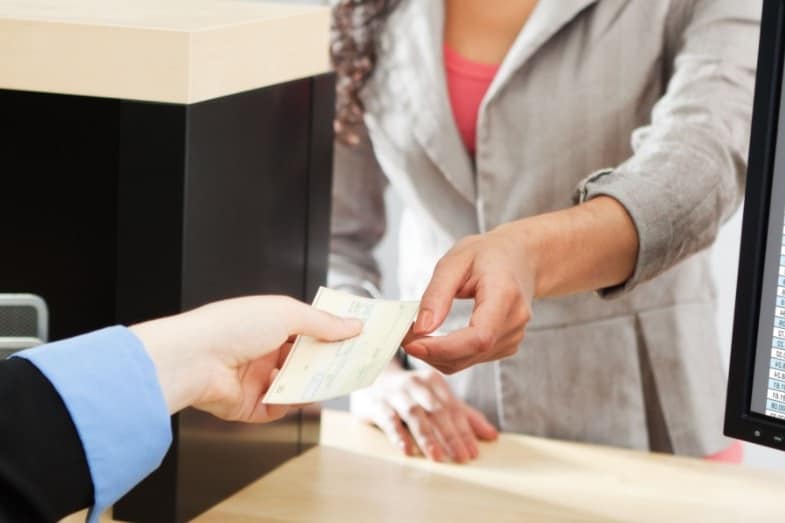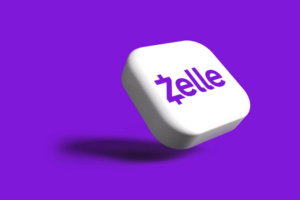Can you deposit someone else’s check in your account? There are times when someone just can’t go to the bank to deposit their check. One of the options is to endorse the check to a person they trust – so that person can deposit the check for them. In this article, I will discuss depositing someone else’s check in your account.
Can you deposit someone else’s check in your bank account? Many banks in the US will allow you to deposit someone else’s check in your account – if the payee or the owner of the check has endorsed the check over to you. They will have to write something like “Pay to (your full name)” and then sign it on the back of the check.
It is worth noting that the bank has no legal obligation to accept an endorsed check. It is a good idea to ask your bank if they will accept this.
Read on to learn more about depositing someone else’s check in your account, including how to do so.
Can You Deposit Someone Else’s Check in Your Account?
So, your friend asks you to deposit his check into your bank account. Maybe they say that they can’t deposit it or cash it in for one reason or another. Can you deposit a check made out to someone else?
Most leading banks in the United States, including Wells Fargo, Chase, Bank of America, TD Bank, and other banks, accept such check deposits. They all have different sets of policies on how they do this. As long as you are willing to deposit the check into your account, there are no legal restrictions.
The banks will accept the check if it has a “For Deposit Only” mark. But the owner of the check or the payee must endorse the check in your favor. The way he can endorse the check is to write the statement: “Pay to (your full name)” at the back of the check. And then sign it below the written statement.
While many banks accept such types of deposits, they do so in their desire to provide extra service to their customers. Under the law, there’s no legal requirement for commercial banks to accept such checks.
Depositing a Third-party Check
The check that you will deposit in your account is called a third-party check. It was made out to your friend, but he endorsed it to your name, so you can deposit it to your bank. Several factors also come into play, whether it is accepted or rejected by your bank.
If the bank knows you fully well and trusts you, they may accept the deposit. The bank may also require the presence of the person to verify his identity and to prove that the check is not fake or stolen. The way your bank evaluates the risk plays a big part in the process.
Depositing a Check Through ATM
Can you deposit someone else’s check in your account through ATM? Yes, the same applies to depositing someone else’s check through an ATM. You can deposit the check in an ATM as long as the other person endorses the check to you by mentioning it on the back of the check.

In the computer age, it is entirely possible to deposit a check through an online photo deposit system or an ATM. If there’s anything wrong with the check, it can be canceled. You will also be notified. The best way to confirm failed transactions is to call your bank.
Crossing of Checks
Before the 1970s, this practice is already widespread. At that time, there was no need to cross the checks. It means there is no need to draw two short parallel lines on the left top corner of the check as a safeguard. In those days, you could easily cash in an endorsed check.
But due to fraud, forgery, counterfeiting, and the like, the crossing of checks became common in issuing checks in commerce and industry, especially with commercial checks. You cannot cash in crossed checks. They have to be deposited and cleared for at least one week before any withdrawal.
Today, more and more commercial transactions use fewer checks. Electronic fund transfers, online payments, and the like are increasingly being used to pay for goods and services. Individual consumers are leading this drive.
Now, even big businesses are issuing fewer numbers of checks. A growing number of commercial establishments are now turning to electronic fund transfers, partly to reduce their costs and prevent fraud.
But businesses and individual consumers still issue checks. They are still useful in the foreseeable future. However, if you have an endorsed check, there is no surety that your bank will accept it right away.
Depositing Endorsed Checks
Surely, some banks will accept the endorsed check. But they may only do so under the following conditions:
- The bank may hold the funds’ release until the check clears with the bank that issued the check (the bank indicated in the check).
- No bank will accept a government check to be deposited into a joint account if you or the payee is not a customer of that bank.
- Some banks will only accept checks that are jointly made out of two individuals, where one of them endorses it to the other so that this other person can deposit it into his own separate account.
- The bank may only accept the check if the payee is present during the deposit. Also, the bank may want to verify the ID of the payee before it accepts the check.
Think Before You Do
Here’s a word of caution: if a person asks you to deposit his check into your bank account, think carefully. Don’t just say yes, right away. Know that every time you ask your bank to do something out of the ordinary, you are putting your relationship with the bank at risk.
What if the check bounces for whatever reason? Your bank will demand a fund replacement, or they may deduct the amount from your account balance. You can also ask the person to return the funds in cash. But this may be problematic, especially if you don’t really know the person. Thus, it is wise to be always cautious about these kinds of situations. Don’t just let anybody play with your emotions.
Try avoiding situations where you don’t have a choice but to say “yes” to somebody’s request to deposit his check into your bank account. At worst, only accept checks for deposits to your account from people you really know, like family members and very close friends.
What Is the Process Involved Here?
When you deposit a friend’s check into your bank account, it will undergo a certain process before funds are credited to your account and consequently released. Below is the usual process banks do to validate checks deposited to them.
1. The bank receives your friend’s check.
2. A bank staff will separate the checks they received according to the banks that issued the checks.
3. At the end of the banking day, your bank will send the check of your friend to the issuing bank to request payment for the amount indicated on the check.
4. When the issuing bank receives the check of your friend, it will verify if the check is authentic and not fake.
- The bank will investigate if the check was written and issued by its customer, who has the authority to write a check.
- Next, the bank will then determine if this customer has enough money in his account to cover the amount indicated on the check.
5. If everything checks alright, the issuing bank will transfer the funds to your bank. Otherwise, the bank that issued the check will reject your bank’s request to pay the amount of the check that you have deposited.
6. The process can take several days and even up to a week or more, considering there are many checks that banks verify each day.
7. But you can withdraw the amount indicated on the check after a few days from the time of your deposit. Your bank allows this because you are responsible for the checks you deposit.
How Can You Deposit Other People’s Checks into Your Bank Account?
A person who receives a check as payment has the liberty to do whatever he wants with it. He can cash it himself, too. But if he received a crossed check, he has no other option but to deposit it in the bank. If he doesn’t have a bank account, he can ask a friend to deposit it in his bank account.
If a friend asks you to deposit his check to your bank, the proper way to deal with this situation is to follow these steps:

1. Check with Your Bank If They Are Accepting This Kind of Transaction
Ask them if they will accept your friend’s check. Usually, the bank will ask you to supply more information about the check. Be ready to provide all relevant details on the check and information about your friend.
2. Your Bank Will Advise You on What You Need to Do
If your bank accepts this kind of transaction, they will instruct you on what you and your friend have to do to deposit the check. Usually, the bank will tell your friend to endorse the check to you. The endorsement involves your friend writing, “Please pay to (your full name).” Then, he needs to sign his endorsement. This endorsement is usually written at the back of the check.
3. Deposit the Check under Your Name and Wait for the Amount to Be Released
It may take a few days to more than a week – if the check clears out. If the check fails validation, the transaction will be canceled. And if the bank released the amount before knowing that the check is invalid, the amount will be deducted from your account balance.
Can you deposit someone else’s check in your account through Chase? Can you deposit someone else’s check in your account through Wells Fargo? Yes, all major U.S. banks, including Chase and Wells Fargo, allow you to deposit someone else’s check in your account.
Remember: It Is You Who Runs the Risk
There is no harm in trying to deposit a third-party check into your bank account. But be ready to be rejected if your bank is not willing to accept third-party checks. It is not legally bound to accept this kind of check.
However, even if your bank accepts your friend’s check, in the ultimate scheme of things, it is really you who runs the risk because it is not your bank. A wise bank will not accept the check if you don’t have enough money in your bank account to cover the amount indicated in the check.
The bank is only a repository for your money. It will not give out funds that you don’t have. So, before they entertain the check, they will first check if you have enough money to cover the check should something go wrong. If they indiscriminately release money left and right, they will go bankrupt fast.
There Are Other Alternatives
There are other options where your friend can cash in his check instead of depositing it in your bank account. Here are some of the alternatives:
1. Cash the Check in the Bank of the Check Owner
The easiest and fastest way is to cash the check in the bank of the person who issued the check. Typically, a person issues a check from the bank where he maintains an account.
2. Cash the Check in Retails Stores
There are national stores that offer check-cashing services. But they may charge a fee of at least a couple of dollars. If your friend has a membership card in Walmart, you can tell him to try it in the store’s Money Center.
3. Deposit the Check to a Prepaid Account
If your friend does not urgently need the cash, he can deposit it in a prepaid account linked to his prepaid debit card. When the check clears, he can spend the money from there.
Conclusion – Can You Deposit Someone Else’s Check in Your Bank Account?
So, to recap, can you deposit a check made out to someone else? Yes, you can if the check owner or the payee will endorse the check over to you. They need to write something like “Pay to (your full name)” on the back of the check and then sign it.
But you should remember that the bank has no legal obligation to accept the check. Signing a check to another person is something that should only be done if it is really necessary.
Related reading:
Pay to the Order of Cash – What Does This Mean on a Check?
Can You Cash a Check at an ATM?
Can You Buy Something with a Visa Gift Card and Return It for Cash?



![Read more about the article Walmart Customer Service Desk Hours [Open and Close]](https://howchimp.com/wp-content/uploads/2021/02/Walmart-customer-service-desk-hours-300x200.jpg)
![Read more about the article US Grading System [What Is the Academic Grading System in the US?]](https://howchimp.com/wp-content/uploads/2021/04/us-grading-system-300x200.jpg)
